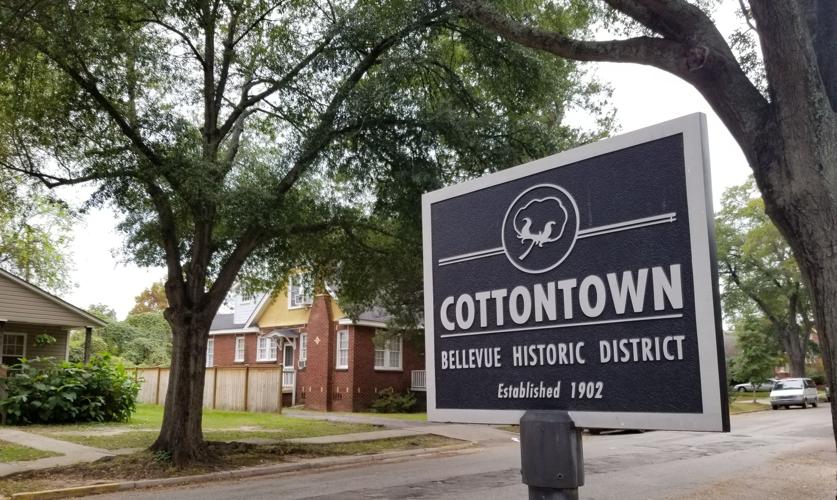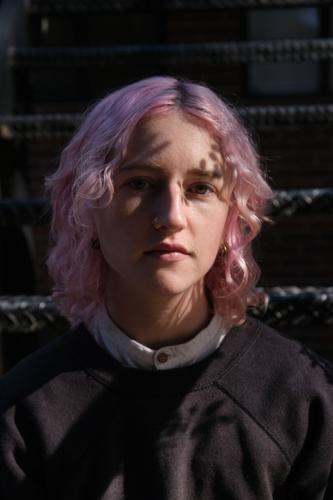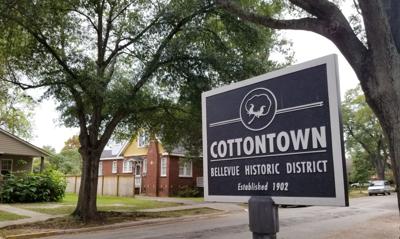So my partner and I went walking. She lives in Cottontown. We took a walk around Cottontown. We walked until Cottontown edges out and starts to erode down, we took respite from a little rain on the steps of a crumbling neighborhood church. Across from the church, an amazing antiquated haunted playground skeleton, a couple squeaking rusting things. And we found that the playground skirts the edge of an extensive, inexplicable field behind it.
The field is just hidden in the back of the neighborhood, is a landmark that plenty of Cottontown residents are probably familiar with. Awesome, huge trees stand around it protectively. There’s an eerie peace. There’s a small fenced-off square of land in the middle of the field. From a plaque, we learn the land is state-owned, and within this little wrought fence in the middle of it are the graves of three dozen Confederate soldiers. It’s absurd, but there is humor here; why the whole field staked off for this little fenced-off simulacrum of peacefulness and privacy in death? The fence is short, the gate is broken. These bones fought for the Confederate cause. Though, yeah, who knows what they felt in their hearts they were fighting for. But there is no sidestepping: we’ve staked off this special little spot for eternity, for some people who gave their lives so that they, their families, may hold on to slavery. Something they felt was apparently very important to keep around. I wish I could pick their brains about it. They went down, white-knuckling even then, the right to put others down.
We walked to the edge of the field, around to the front, opposite the playground. Tucked in a bundle of trees is another sign, a bigger one. This sign says: yes, that whole field you walked through? That’s a mass grave. We’re being very cool about it. But the nearby Bull St. mental hospital used this whole field as a site for bodies of mental patients. Unmarked, unclaimed. What did they have to represent? In the middle, we put the real soldiers, do not worry, we put a little fence around the brave ones, to separate the wheat from the chaff.
On Feb. 25, 2024, a 25-year-old member of the air force set himself on fire in front of the Israeli embassy to protest the war on Palestine. Before he took his life, he wrote an email to reporters explaining his act. He left a thought-out will.
“I will no longer be complicit in genocide,” he wrote on Twitch, before live-streaming the event. “I am about to engage in an extreme act of protest. But compared to what people have been experiencing in Palestine at the hands of their colonizers, it’s not extreme at all. This is what our ruling class has decided will be normal.”
He wore his fatigues. His name was Aaron Bushnell.
The event has agitated a rupture in modern political discourse. It’s worth noting that this rupture is not new, was already rife, looking infected. The temptation apparently exists at large to invest more energy in aversion to his intensity than trust in his conviction. While researching for this column, I found myself on the side of the internet that sees his act not as an incredibly courageous, firm statement of protest, but haphazard, reckless and setting an unnecessary precedent of self-harm.
His mental health has been called into question by those who reject the idea that suicidal action could ever constitute a legitimate form of protest. But when soldiers do it, lose their lives, put themselves in fatal situations for political reasons, it’s honor. It’s blanket respect. Why when soldiers die for an American cause, it is an honor, the highest honor. Bushnell’s act, his brave statement of protest and looking genocide sternly in the face, Bushnell himself, straddled the line in this very distinct way. One foot in the fenced-in veteran cemetery. One foot in the mass grave of the mentally ill, exiled, lumped together and dismissed as one of many disturbed voices.

Cassidy Spencer is a writer and columnist for Free Times. Photo by Alyssa Thorn/Special to the Post & Courier
If his actions could be dismissed as that of the mentally ill, others can shirk the weight of collective responsibility to take action. ‘This event doesn't call for such extreme behavior, he was just being extreme.’ It’s the ultimate dismissal tactic. (At what point in this country was it decided that the lives, minds and perspectives of those struggling with mental illness are of innately less value?)
He was a soldier. But he lost his life not for the sake of this country. He could see when this country was taking action he couldn’t stand by. I’ve watched the right-wing internet try to metabolize this. Historically, they like soldiers. They like the part of their history that glorifies soldiers. Often, that glorification is capable of turning a blind eye to a lot. Like how our precious little plot (the plaque and the parcel and the old, heavy headstones and the simulated honor of it all) turns a blind eye to the fact that those soldiers fought to uphold slavery. Slavery seemed, I guess, like an American-enough cause to defend. American enough; so, subsequently, brave enough, worth losing one’s life for. When Bushnell’s cause strayed from the country, its validity was called into question; at which moment some decided that his legacy was exiled from the promised land: that stout wrought-iron fence and gate.
Many others do see him clearly; his clarity of principle, action taken that actually, finally, reflects the scale of horror and outrage on behalf of Gaza’s nearly 30,000 dead.
Falling in line with the fanatical protection of Confederate legacies (and this country’s entire history of colonial singlemindedness), the slave’s experience, the Native American experience and the Palestinian experience, gets othered and belittled in the xenophobic American retelling. The negligent patriotic perspective reels, complains about ‘reckless lefties’ on the New York Post, sings songs about fireworks, goes right on and on over many pained, desperate calls for mercy. The calls have reached a head. Obviously. There’s not much louder a statement one can make than Bushnell’s.
Nationalism gorges itself, sits fat, and proud, loud and blind.
And stubbornly, never, never spoken for by the mentally ill, God no.











